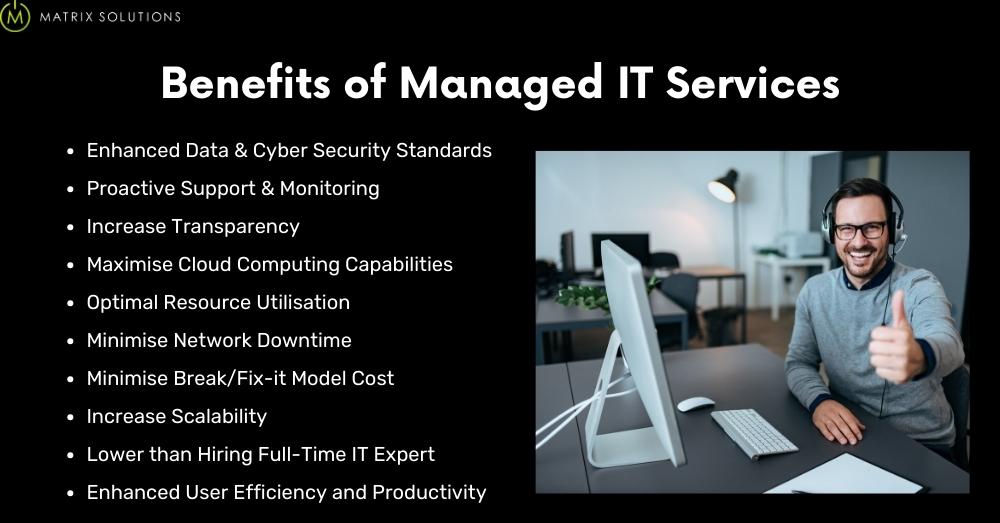Whether you are a proficient IT professional or a business administrator, managed IT services help you accomplish your core competencies and enhance your business seamlessly. Managed IT services simplify your job for both large or small and medium-sized enterprises(SMEs).
With the power of managed services, you can focus on what matters most. Besides, there are other benefits of using managed IT services in business. Let’s explore the top 10 business benefits of managed IT services.
The managed services model incorporates dedicated industry knowledge and technical expertise. Moving on, let’s discover some of the additional benefits of managed IT services:
- Cut-off overhead cost
- Free in-house IT department
- Right expertise for the ongoing services
- Outsourced IT strategies
- Monitor IT system
- Safeguard business continuity
- Increase productivity
Who needs managed IT services?
Both large enterprises and SMEs need managed IT services to obtain optimal support for businesses to thrive, ultimately increasing productivity and efficiency. Managed It services also help minimise additional operational costs for businesses.
Now, take a look at the key indications for managed IT services:
- When your team is overburdened with too many tasks, you must complete them quickly.
- The role of in-house staff extends to handling IT infrastructure and cybersecurity-related issues.
First and foremost, you should invest in upscaling your technology while expanding your business.
Spending too much time on maintenance or resolving technical issues decreases efficiency and leads to missed opportunities.
If you’re facing any of these problems while running your business, it’s advisable to consider hiring a managed IT service provider.
What are the benefits of managed IT services?
The annual data breaches lead to costly data loss and reputation damage. Managed IT services leverage the maintenance of day-to-day operations while fulfilling businesses’ short and long-term necessities. Matrix Solutions consolidates enhanced services with optimal resource utilisation and cost savings. Additionally, they implement 24/7 remote monitoring, handle network infrastructure, and much more.
Now, let’s delve deeper into the 10 benefits of managed IT services.

Enhanced Data & Cyber Security Standards
Businesses often miss out on valuable opportunities because they require well-managed managed IT services. As a result, many companies invest most of their time and resources in advancing their technology to stay competitive. Managed IT service providers play a crucial role in simplifying this process by implementing enhanced data and cybersecurity standards within their IT infrastructure.
Key Benefits
- Reduces risk of damage from malicious attacks and human errors
- Less downtime
- Reduced vulnerabilities
- Enhanced data protection
- Security strategies
Proactive Support & Monitoring
Managed service providers have a dedicated team of experts working together to detect issues in IT infrastructure and applications before users notice. We provide proactive support and monitoring for your system.
Key Benefits
- Early detection of potential threats and unauthorised access
- 24/7 support
- Report back changes
- Analysis of data to identify potential threats and opportunities
- Real-time tracking
- Proactive identification of the problem and resolve them
Increase Transparency
Transparency represents the visibility or accessibility of information, especially concerning business problems. We study the inner workings of your organisation’s technology in detail and build transparency and authority.
Key Benefits
- Encourages trust
- Peace of mind
- Accountability
- Future IT spending strategies based on the current status
- Saves from technical debt
Maximise Cloud Computing Capabilities
Cloud computing has a unique feature of scaling storage and computer resources. It enables small businesses to adjust their IT resources up or down based on demand. This flexibility and scalability enhance the company’s capabilities.
Key Benefits
- Lowering security risks
- Easing the complexity of cloud computing
- Optimising infrastructure costs
- Improving process scalability
- Streamlining on-premises and off-premises migrations
Optimal Resource Utilisation
Optimal resource utilisation aids businesses in achieving maximum cost savings, promoting sustainable growth, and greater efficiency. Managing an in-house team maximises costs rather than hiring outsourced managed IT services. The in-house team incurs sunk costs such as monthly salaries, benefits, insurance, and office upkeep.
Key Benefits
- Focus scarce resources on the projects that provide the most business benefits
- Maintain productivity
- Be more cost-effective than hiring permanent staff
- Enhance performance
- Boosts productivity
- Prevent burnout
Minimise Network Downtime
The average minute of downtime costs businesses around $5,600. Luckily, we have managed service providers to proactively minimise downtime through network monitoring and management, comprehensive business strategies, on-site/ off-site data backup, and disaster recovery services.
Key Benefits
- Continuously monitoring your infrastructure
- Have a backup and recovery plan
- Performing back-and-forth testing
- Implementing predictive analytics
- Implementing redundant systems
Minimise Break/Fix-it Model Cost
The rapid pace of innovative technological changes results in higher costs higher for adapting to these changes in the IT industry. Businesses need to manage technical debt. While service agencies offer modern technologies that reduce the cost of the tranditional break/fix-it model.
Key Benefits
- Predictable monthly costs
- Reduced system failure
- Long-term management and monitoring of IT infrastructure
Increase Scalability
Businesses require technological advancements. As your business expands, it becomes necessary to scale up or scale down your resources. Most companies encounter challenges while trying to anticipate their technological requirements as they outgrow existing resources. Managed service providers play an important role in providing the support and services needed to manage this growth.
Key Benefits
- Support for evolving needs
- Facilities smoother business growth
- phases through extensions
- Optimal resource allocation
Lower than Hiring Full-Time IT Expert
Companies find it challenging to find top-notch IT personnel due to the higher costs. If they are successfully hired, retaining them within your organization can be difficult. Instead of hiring full-time IT experts, you can consider outsourcing managed IT services, which offer services as provided by full-time IT experts.
Key Benefits
- Benefits of on-call expertise
- Cost saving for a fraction of the cost of hiring a full-time specialist
- Free up internal resources that are currently dedicated to IT tasks
Enhanced User Efficiency and Productivity
Service providers enhance productivity and user efficiency through strong end-to-end support. On top of that, we focus on specific skill sets, training, certifications, and experience tailored to your industry. Employees, users, and staff amplify their knowledge and productivity through up-skilling activities.
Key Benefits
- Consistently operating
- Proactive approach
- Monitoring and maintaining your system
Future Roadmap of Managed IT Services
The future roadmap of managed IT services is a sequence of events that must be incorporated into your business process within a limited time frame to achieve the desired results. To get the required result, you may need to scale up or scale down resources. It is important to make the appropriate technology selections, invest in infrastructure development, provide training, and hire an experienced workforce.
A business IT roadmap comprises the appointment of a virtual CIO, IT deployment with a proper tech-roadmap providing necessary skills and resource support, proactive monitoring services, creating a strategy, and disaster recovery planning.
Appointment of Virtual CIO
A virtual CIO bridges the gap between the limited IT resources and your organisation’s business goals. They help to determine business requirements. Subsequently, we address the identified weaknesses through their investigation, offering necessary solutions and recommendations. Furthermore, we manage everything from operations and IT support to sales, services, and finance planning, working to develop a successful IT roadmap.
IT Deployment with Proper Tech-Roadmap
Every organisation wants to be up to date with the latest technology. The in-house team might find it challenging to install new technologies based on the technical roadmap. Sometimes, you don’t have enough time to update the system. To resolve this issue, service providers take the day-to-day wear and tear responsibilities of monitoring, maintenance, and troubleshooting so that the in-house team can focus on major organisational goals.
Provide Necessary Skill and Resource Support
In many cases, both large corporations and SMEs have limited experts with specialized skills. If a project is discontinued for any reason, the company might incur losses. To mitigate these situations, outsourcing IT infrastructure providers is a viable solution. These providers bridge the skills gap between your team and a team of experts.
Proactive Monitoring Service
Managed IT service providers offer continuous technical support to allow you to focus on implementing the system. They provide 24/7 vigilant monitoring and maintenance to ensure the security and success of your system and network.
Create Your Strategy
When you plan to create a technical roadmap, you must create a strategy tailored to your business needs. Moreover, it must be firm yet allow for some flexibility. An IT roadmap involves incremental development steps, guiding you toward your strategic goals, with a focus on achieving long-term objectives.
Plan for Disaster Recovery
Data loss is an ever-present risk that companies must acknowledge and prepare for comprehensive data security and recovery measures. Managed IT service partner initiate and plan backup, infrastructure development, and disaster recovery system.
Maximise Efficiency with Matrix Solutions as Your Managed IT Services Partner
Matrix Solutions is your trusted managed IT service partner in Australia, with a proven track record of excellence, particularly in the legal sector. We offer specialised expertise in cybersecurity, private cloud solutions, and integrated managed IT services.
Our commitment to growth extends to empowering small and medium-sized businesses (SMEs), where we bring our top-tier knowledge and support to fuel your success. When you choose Matrix Solutions, you’re selecting a partner dedicated not only to meeting your needs but also to exceeding your expectations, safeguarding your digital assets, and propelling your business toward a prosperous future.
FAQs on Benefits of Managed IT Services
How can managed IT services help your business?
Managed IT services help your business strategically daily, including upgrading equipment, automating tasks, and redesigning your workflow model. Additionally, with disaster recovery and backup solutions, you can ensure your systems remain available for 24/7, allowing you to focus on your core business processes.
What are the advantages of outsourcing managed IT services?
The immediate advantages of outsourcing managed IT services are listed below:
- Stay focused on your core business
- Rapid advancement of new technology
- Get suggestions from the IT expert team
- Reduce labor costs
- Reduce control and maintenance IT costs
- Increase efficiency and competitiveness
What are the benefits of a managed services partner?
The main benefit of a managed services partner is the prevention of expensive network problems. It eliminates new IT staff hiring and training costs and reduces downtime.
What is the purpose of managed services?
The main purpose of managed services is to enhance IT operations and reduce costs by reducing directly employed staff. In addition, they maintain and anticipate a diverse array of services and functions, ensuring seamless adjustments to the evolving needs of clients. Managed services provide high-quality service and free internal teams to focus on specific tasks related to their business.
Difference between managed service provider and managed IT service.
The difference between managed service providers and managed IT services is as follows:
A managed service provider is a third-party company that remotely operates a customer’s information, technology infrastructure, and end-user systems.
A managed IT service involves ongoing support provided by an IT service provider for a fixed monthly fee. This support includes proactive monitoring and maintenance, priority support for users, and device management to keep IT systems operating at peak performance.










